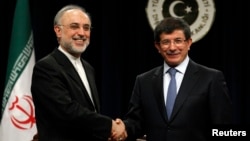ISTANBUL —
Iran's recent agreement with world powers to curb parts of its nuclear program in exchange for a possible easing of sanctions has spurred hopes in Ankara of a major trade and finance opportunity.
Turkish Foreign Minister Ahmet Davutoglu recently traveled to Tehran, where he committed his country to a major expansion of trade, saying Ankara is determined to increase trade volume with Iran to over $30 billion and aims for $100 billion by 2020.
Trade volume between the neighboring countries volume now is around $20 billion, the bulk of that coming from energy-scarce Turkey's fuel imports.
Turkey is the biggest importer of Iranian gas.
Turkish economy minister Zafer Çağlayan has called on banks to reopen financial relations with their Iranian counterparts.
"Turkey has a very efficient middle value added manufacturing industry," said Atilla Yesilada, an analyst for political consulting firm Global Source Partners.
"Clearly our commercial agricultural fruits and vegetables are far superior," he added, explaining that there is a potential for substantial growth in Turkish exports to Iran. "There is tremendous overlap, and if Iran ever returns to the international order, it will have major program of renovating its refineries, developing its aging fields, etcetera. All of these things would be tremendously beneficial for Turkish economic actors."
According to Inan Demir, chief economist of Istanbul-based Finansbank, Turkish exports to Iran are already on the rise despite continued trade restrictions, a trend likely to continue with the easing of sanctions.
"This could help through exports to Iran, [although] it’s difficult to be very precise about the magnitude of higher exports," said Demir. "In the first nine months of the year, Turkey’s exports to Iran [totaled] $3.7 billion ... one the largest figures on record."
But Demir warns that Çağlayan's call to reestablish banking relations could have negative repercussions for Turkish banks if Iranian financial sanctions are lifted.
"Iran now will be able to repatriate some of its [foreign currency] holdings abroad as the sanctions are eased in a limited fashion ... and Turkey would be one of the source countries," he said. "So it's likely we could some outflows in [foreign currency] and gold, I would presume, as the sanctions are lifted and Iran is able to repatriate. So I think this another channel of impact that one should consider."
Ultimately, analyst Yesilada says how much bilateral trade grows is likely to be determined by politics rather than economics.
"There is really no guarantee that Iran would ever [have] Turkey [as] its primary trading partner," he said. "Iran perceives Turkey for what it is. We are a major stumbling block for their regional objectives and their de facto major rival in the region, an ally of the West. Unfortunately this is a region where trade, like anything else, is a diplomatic weapon. The market forces don’t work efficiently here."
Turkish-Iranian relations have been strained over Syria in particular, with Ankara and Tehran supporting opposite sides in the ongoing civil war. But the diplomatic rapprochement underway is one that, observers say, could bring economic gains.
Turkish Foreign Minister Ahmet Davutoglu recently traveled to Tehran, where he committed his country to a major expansion of trade, saying Ankara is determined to increase trade volume with Iran to over $30 billion and aims for $100 billion by 2020.
Trade volume between the neighboring countries volume now is around $20 billion, the bulk of that coming from energy-scarce Turkey's fuel imports.
Turkey is the biggest importer of Iranian gas.
Turkish economy minister Zafer Çağlayan has called on banks to reopen financial relations with their Iranian counterparts.
"Turkey has a very efficient middle value added manufacturing industry," said Atilla Yesilada, an analyst for political consulting firm Global Source Partners.
"Clearly our commercial agricultural fruits and vegetables are far superior," he added, explaining that there is a potential for substantial growth in Turkish exports to Iran. "There is tremendous overlap, and if Iran ever returns to the international order, it will have major program of renovating its refineries, developing its aging fields, etcetera. All of these things would be tremendously beneficial for Turkish economic actors."
According to Inan Demir, chief economist of Istanbul-based Finansbank, Turkish exports to Iran are already on the rise despite continued trade restrictions, a trend likely to continue with the easing of sanctions.
"This could help through exports to Iran, [although] it’s difficult to be very precise about the magnitude of higher exports," said Demir. "In the first nine months of the year, Turkey’s exports to Iran [totaled] $3.7 billion ... one the largest figures on record."
But Demir warns that Çağlayan's call to reestablish banking relations could have negative repercussions for Turkish banks if Iranian financial sanctions are lifted.
"Iran now will be able to repatriate some of its [foreign currency] holdings abroad as the sanctions are eased in a limited fashion ... and Turkey would be one of the source countries," he said. "So it's likely we could some outflows in [foreign currency] and gold, I would presume, as the sanctions are lifted and Iran is able to repatriate. So I think this another channel of impact that one should consider."
Ultimately, analyst Yesilada says how much bilateral trade grows is likely to be determined by politics rather than economics.
"There is really no guarantee that Iran would ever [have] Turkey [as] its primary trading partner," he said. "Iran perceives Turkey for what it is. We are a major stumbling block for their regional objectives and their de facto major rival in the region, an ally of the West. Unfortunately this is a region where trade, like anything else, is a diplomatic weapon. The market forces don’t work efficiently here."
Turkish-Iranian relations have been strained over Syria in particular, with Ankara and Tehran supporting opposite sides in the ongoing civil war. But the diplomatic rapprochement underway is one that, observers say, could bring economic gains.




